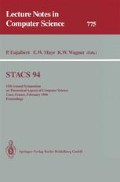Abstract
Using the automata with constraints, we give an algorithm for the decision of ground reducibility of a term t w.r.t. a rewriting system R. The complexity of the algorithm is doubly exponential in the maximum of the depths of t and R and the cardinal of R.
Preview
Unable to display preview. Download preview PDF.
References
B. Bogaert and S. Tison. Equality and disequality constraints on brother terms in tree automata. In A. Finkel, editor, Proc. 9th Symp. on Theoretical Aspects of Computer Science, Paris, 1992. Springer-Verlag.
R. Bündgen and W. Küchlin. Computing ground reductibility and inductively complete positions. Universitaet Tübingen, Oct. 1988.
A.-C. Caron, J.-L. Coquidé, and M. Dauchet. Encompassment properties and automata with constraints. In Proc. RTA 93, 1993.
H. Comon. Unification et disunification: Théorie et applications. Thèse de Doctorat, Institut National Polytechnique de Grenoble, France, 1988.
N. Dershowitz and J.-P. Jouannaud. Notations for rewriting. EATCS Bulletin, 43:162–172, 1990.
M. Gécseg and M. Steinby. Tree Automata. Akademia Kiadó, Budapest, 1984.
J.-P. Jouannaud and E. Kounalis. Automatic proofs by induction in theories without constructors. Information and Computation, 82(1), July 1989.
D. Kapur, P. Narendran, D. Rosenkrantz, and H. Zhang. Sufficient completeness, ground reducibility and their complexity. Acta Inf., 28:311–350, 1991.
D. Kapur, P. Narendran, and H. Zhang. On sufficient completeness and related properties of term rewriting systems. Acta Inf., 24(4):395–415, 1987.
E. Kounalis. Completeness in data type specifications. In Proc. EUROCAL 85, Linz, LNCS 204, Pages 348–362. Springer-Verlag, Apr. 1985.
E. Kounalis. Testing for the ground (co)-reducibility in term rewriting systems. Theoretical Comput. Sci., 106(1):87–117, 1992.
T. Nipkow and G. Weikum. A decidability result about sufficient completeness of axiomatically specified abstract data types. In Proc. 6th GI Conf. Springer-Verlag, 1982.
D. Plaisted. Semantic confluence tests and completion methods. Information and Control, 65:182–215, 1985.
M. Rabin. Decidable theories. In J. Barwise, editor, Handbook of Mathematical Logic, pages 595–629. North-Holland, 1977.
W. Thomas. Automata on infinite objects. In J. van Leeuwen, editor, Handbook of Theoretical Computer Science, pages 134–191. Elsevier, 1990.
Author information
Authors and Affiliations
Editor information
Rights and permissions
Copyright information
© 1994 Springer-Verlag Berlin Heidelberg
About this paper
Cite this paper
Comon, H., Jacquemard, F. (1994). Ground reducibility and automata with disequality constraints. In: Enjalbert, P., Mayr, E.W., Wagner, K.W. (eds) STACS 94. STACS 1994. Lecture Notes in Computer Science, vol 775. Springer, Berlin, Heidelberg. https://doi.org/10.1007/3-540-57785-8_138
Download citation
DOI: https://doi.org/10.1007/3-540-57785-8_138
Published:
Publisher Name: Springer, Berlin, Heidelberg
Print ISBN: 978-3-540-57785-0
Online ISBN: 978-3-540-48332-8
eBook Packages: Springer Book Archive

